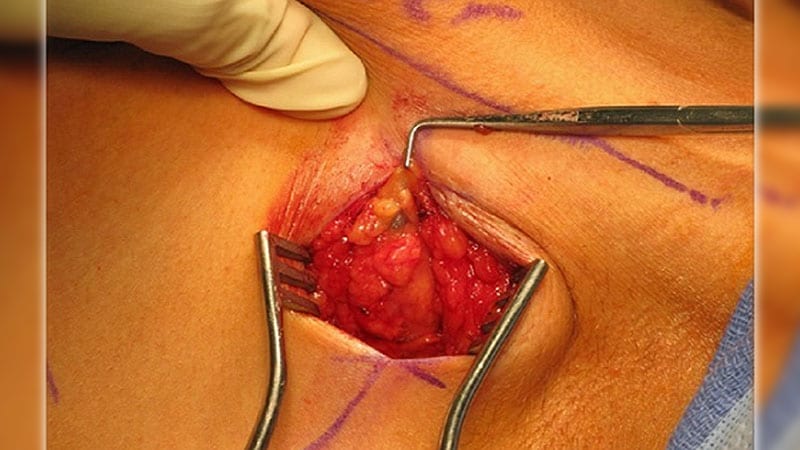
TOPLINE:
Women with node-negative breast cancers 2 cm or smaller and negative preoperative axillary ultrasound results may be safely spared sentinel lymph node biopsy (SLN) biopsy, new research suggests.
METHODOLOGY:
-
SLN biopsy is standard for axillary staging in early breast cancer, but whether this biopsy is necessary and whether imaging could replace it remain uncertain.
-
In the prospective SOUND trial, researchers randomized 1405 women with node-negative breast cancers up to 2 cm and negative preoperative axillary ultrasound 1:1 to SLN biopsy or no axillary surgery.
-
The primary outcome was 5-year distant disease-free survival (DFS), analyzed as intention-to-treat in 708 women randomized to SLN biopsy and 697 to no axillary surgery.
-
Most patients (87.8%) had ER-positive ERBB2-negative disease, were postmenopausal (78%), and had T1 tumors (95%). In the biopsy group, 13.7% of patients had positive axillary nodes.
-
Secondary end points were the cumulative incidence of distant recurrences and axillary recurrences, disease-free survival (DFS), and overall survival.
TAKEAWAY:
-
Overall, omitting SLN biopsy did not appear to affect outcomes, with patients demonstrating similar 5-year locoregional relapse rates with and without SLN biopsy (1.7% vs 1.6%), 5-year distant metastases (1.8% with vs 2.0% without), and 5-year distant DFS (97.7% with vs 98.0% without).
-
Five-year overall survival was also similar between the two groups: 98.2% among those who received SLN biopsy and 98.4% among those who did not.
-
Overall, 21 (3.0%) deaths were observed in the SLNB group and 18 (2.6%) deaths in the no axillary surgery group.
-
The authors reported no significant differences in adjuvant treatment recommendations between the two groups.
IN PRACTICE:
“The results of this trial support the safety of omitting axillary surgery in older postmenopausal women with ER-positive ERBB2-negative [breast cancer] who met the SOUND eligibility criteria,” the study authors concluded.
In an accompanying editorial, Seema A. Khan, MD, agreed that the outcome data support “the argument that sentinel node positivity is not, in and of itself, a critical parameter that determines therapeutic plans and outcomes in patients with stage I breast cancer.”
SOURCE:
The study, led by Oreste Davide Gentilini, MD, San Raffaele Scientific and Research Hospital, Milan, Italy, was published online September 21 in JAMA Oncology, with an editorial by Seema Khan, MD, Northwestern University, Feinberg School of Medicine, Chicago, Illinois.
LIMITATIONS:
The study enrolled patients who could be considered low risk for recurrence in the short-term (median tumor size of 1.1 cm and 87.8% of patients had hormone receptor positive, ERBB2-negative disease). The authors noted that differences in outcomes might appear over a longer follow-up period.
DISCLOSURES:
The SOUND trial was funded by the European Institute of Oncology Foundation. Some authors report personal fees from pharmaceutical companies.
For more from Medscape Oncology, join us on X(formerly known as Twitter) and Facebook.
Source: Read Full Article